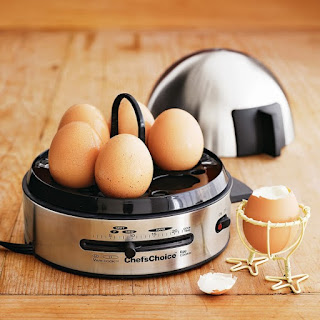How to Make Easily Hard-Boiled Eggs
1.
Spot eggs in pot huge enough to hold them in a single layer. add cold water to
cover eggs by 1 inch. Warmth over high warmth just to bubbling.
2.
Remove from the burner. spread skillet. Give eggs a chance to remain in heated the water around 12 minutes for huge eggs.
3.
Channel quickly and serve warm. Or on the other hand, cool totally under chilly
running water or in a bowl of ice water, then refrigerate.
Despite
the fact that the cooking water must go to a full bubble in this strategy, the dish is quickly removed from the warmth with the goal that the eggs cook
tenderly in the high temp water. This produces delicate, not rubbery, eggs and
limits breaking.
Banish
the greenish ring. This innocuous yet unattractive staining that occasionally
conforms to hard-boiled yolks results from a response between sulfur in the egg
white and iron in the yolk. It happens when eggs have been cooked for a really
long time or at too high a temperature. Our tips for hard-boiled eggs-cooking
eggs in hot, not bubbling, water, then cooling quickly limits this.
Since
you've aced the craft of hard-boiled eggs, how would you strip the eggs without
making a wreck?
The most neo egg boiler can be difficult to strip. To guarantee effectively stripped hard-boiled eggs, purchase and refrigerate them seven days to 10 days ahead of time of cooking. This concise "breather" permits the eggs time to take in air, which helps separate the layers from the shell.
The most neo egg boiler can be difficult to strip. To guarantee effectively stripped hard-boiled eggs, purchase and refrigerate them seven days to 10 days ahead of time of cooking. This concise "breather" permits the eggs time to take in air, which helps separate the layers from the shell.
Hard-boiled
eggs are least demanding to strip directly in the wake of cooling. Cooling
makes the egg contract marginally in the shell.
To
strip a hard-boiled egg: Gently tap egg on the ledge until the shell is finely
popped everywhere. Move egg between hands to relax shell. Beginning stripping
everywhere end, holding the egg under chilly running water to help dial the
shell down.
Capacity
time: In the shell, hard-boiled eggs can be refrigerated safely as long as
multi-week. Refrigerate in their unique container to avoid smell assimilation.
When stripped, eggs should be eaten that day.
Sanitation
precautionary measure: Piercing shells before cooking isn't prescribed. If not
sterile, the piercer or needle can bring microscopic organisms into the egg.
Additionally, penetrating makes hairline breaks in the shell, through which
microbes can enter in the wake of cooking.
Never
microwave eggs in shells. Steam develops excessively rapidly inside and eggs
are probably going to detonate.
High
altitude cooking: It's practically difficult to hard-bubble eggs over 10,000
feet.



Comments
Post a Comment